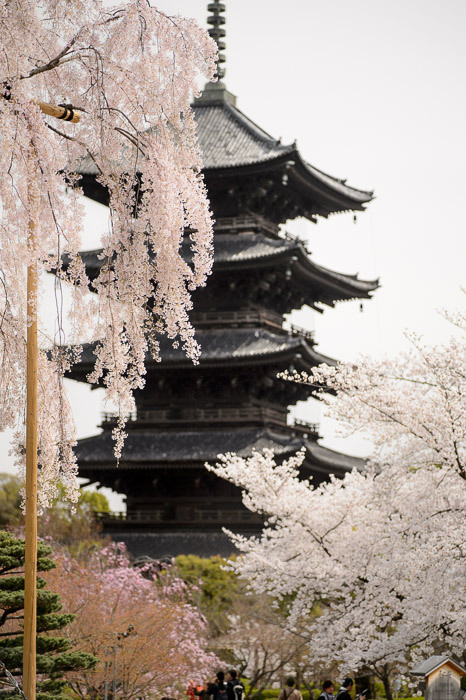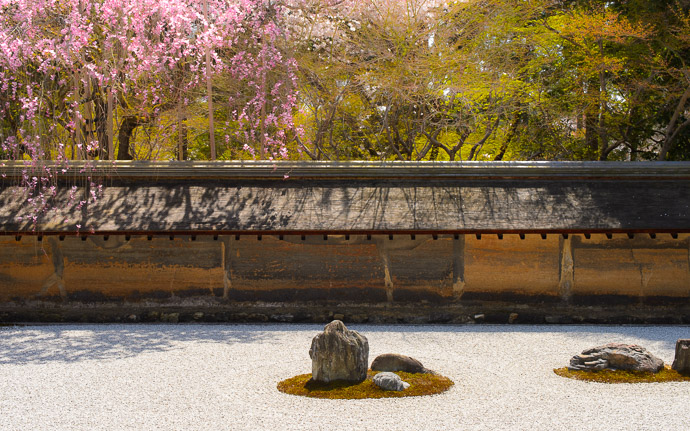
Nikon D4 + Voigtländer 125mm f/2.5 — 1/500 sec, f/2.5, ISO 140 — map & image data — nearby photos
As Peaceful As...
... backup storage that doesn't crash
(Recent posts have been filled with fall colors, so for some balance, I'm dipping into my cherry-blossom archives)
For the last few years I've had a Synology DS1511+ NAS unit... an always-on “network drive” that sits in a closet at home that I can access on my home network from all my computers at home. I use it for local Time Machine backup, as well as a local CrashPlan repository for various backups. (I also use CrashPlan to keep backups offsite.)
The Synology unit has five drive bays, which I initially populated with 3TB Seagate Barracuda drives.
That was a mistake.
Five drives at 3TB each ostensibly adds up to 15TB of storage, but I set it up in a fail-fail-safe RAID configuration, meaning that even if two drives crash at the same time, the data remains available. That left me with 9TB of usable, relatively safe local storage.
That was a good idea.

Nikon D4 + Voigtländer 125mm f/2.5 — 1/1000 sec, f/2.5, ISO 100 — map & image data — nearby photos
Toji Temple (東寺)
Kyoto, Japan
With disk drives, it's never “if” it will crash, but “when”. When the first drive crashed after about a year, I yanked it out of the drive bay (while the Synology DS1511+ was still running... it allows for “hot swap”) and put in a spare that I had ordered along with the initial five, for just such an occasion. The Synology then used the new drive to rebuild the redundancy in the background, and all was well.
The Seagate drive was under warranty, so I packed it up and shipped it off to a Seagate processing facility near Tokyo, at my own expense. It was a hassle, but they sent me a new (refurbished) drive.

Nikon D4 + Nikkor 14-24mm f/2.8 @ 14mm — 1/500 sec, f/11, ISO 360 — map & image data — nearby photos
Ryouanji Temple (龍安寺)
Kyoto, Japan
Anyway, to cut to the chase, in the three years since I bought those 6 Seagate Barracuda drives, I've had 7 or 8 of them bad. They get replaced, and the replacement goes bad. The most recent, last week, was a drive that had been replaced by Seagate just six weeks earlier.
One time, two drives crashed within hours of each other. I was very happy I'd opted for the fail-fail-safe configuration. I replaced one of the failed drives right away, but didn't have a second spare, so I courted danger by running in just fail-safe mode for a week or so until the replacement came.

Nikon D4 + Voigtländer 125mm f/2.5 — 1/500 sec, f/2.5, ISO 100 — map & image data — nearby photos
Looking
for a disk that doesn't crash
I think the problem is that these Seagate drives are “Desktop” drives, which means they're intended for a PC.... perhaps a PC that's shut down every night? (I rarely shut down my computers, FWIW.)
Having gotten so sick of the hassle of sending these back to Seagate, I decided to buy some new drives. I went with Western Digital “Red” 4TB NAS drives.. They're specifically built for (or, at least, marketed for) use in NAS units, so hopefully I'll have better luck going forward.

Nikon D4 + Nikkor 50mm f/1.4 — 1/100 sec, f/11, ISO 720 — map & image data — nearby photos
Rocks
as useful as dead disk drives
I feel for you. I spent my day off today backing up Yoshiko’s iPhoto to Blu-Ray disks, because, well, you never know. I only buy Buffalo external drives, and haven’t had one (of four) fail yet. I got a nifty portable Buffalo Blu-Ray recorder for only ¥4800 this summer, and am just now getting around to doing my backups. A bit over 80 GB of her data went onto 4 disks in a couple hours of work, and I will store them away from our home. Worth the hassle.
Have you seen the long-running series of posts by the Backblaze people about the failure rates of (consumer grade) drives in their RAID arrays? They have a properly large sample size, though of course their environment will not be the same as yours.
I think the environment does make a big different though. Backblaze found it wasn’t worth paying extra for ‘enterprise class’ drives. My only other large sample is the drives we used to ship in telecoms servers – there it most definitely was worth the extra, but perhaps the vibration levels are higher in telco equipment racks.
I hadn’t seen that, thanks. I think it’ll be Hitachi drives next time! —Jeffrey
As a single data point: I’ve been running 5 WD Red 3TB drives in a DS1512+ for over a year now, and I have yet to have a single one fail.
I’ve almost always used Hitachi drives (HGST), which was basically IBM drives before they sold to Hitachi. Never had serious issues, and no failure yet (no, I’m not crossing my fingers: I have backups 🙂 I did have a nasty problem with a Samsung 2.5″ spinning-rust drive, but that’s about it.
Some drives are “power saving” and have to start/stop often, which puts more strain on the motor and that’s the part that then fails first. ‘Better to buy good ol’ 3.5″ 7200RPM drives. I think Seagate is the only one doing this on 3.5″ drives.
Here are some numbers to help you choose…
https://www.backblaze.com/blog/what-hard-drive-should-i-buy/
This was interestingly relevant for me – we’ve just ordered a DS1513+ with 5 x Western Digital Red drives… Hoping they last as well as the RAID arrays in the HP servers we’re replacing – almost 7 years with no failures…
I want to add my mark about WD drives: I have a MyBook World Edition that is running two 2TB WD Green drives (my NAS predates the Red line of drives) manufactured late 2010. It’s been running continuously for four years now with no issues. I run in RAID 1 mode, though, just to be safe.
(Additionally, here is where I finally tell you that I copied your site layout for a site I built about four years ago. Credit to you is in the footer.)
(Additional additionally, I’m visiting Tokyo soon. It really is a small world.)
I think you’ll be happy with the Red drives. I have five (plus a hot spare) 3 TB Reds in a homemade NAS running FreeBSD with ZFS and they’ve been humming along for about two years without so much as a hiccup. Performance is quite good as well. And for what it’s worth, I’ve generally found WD drives to be more reliable than Seagate ones, anyway.
Fantastic pictures Jeffrey! At the second picture (Toji Temple) I thought it’s at Kiyomizu-dera. Because that temple has some similarities. My favorite is the last one. 🙂
It’s time to change my desktop!:D
Endre Toth
from Budapest, Hungary
Just as a reference point. I’ve been running 2xSeagate’s 3TB Barracuda’s in a DS214+ along with 2x2TB Seagate Barracuda’s for about two years with no failures. These have been on 24×7 the whole time, the only down-time they get is when I ugrade the OS on the Synology and have to do a reboot. IMHO YMMV.
Just switched to the 3TB WD Red drives myself, have been running 4 Seagate in my DS412+ for the past 3 and a bit years 24/7 with no issue (until last week when a SMART test flagged a failing drive), if I had the money then I would opt for Enterprise,however with an AWS backup plan, I figure given the enterprise drives are 4 times more expensive, I dont mind replacing the normal (PC) drives every few years.